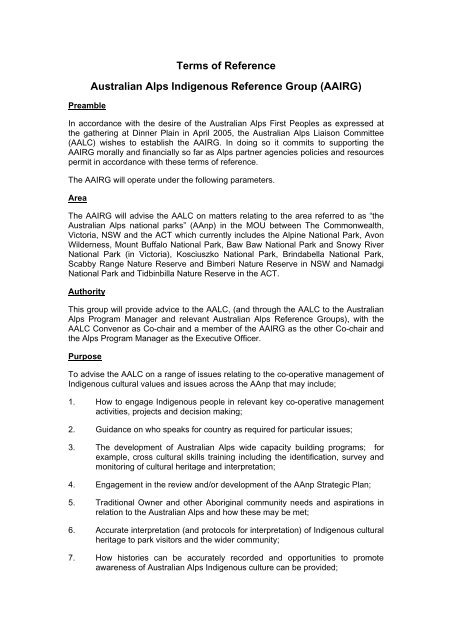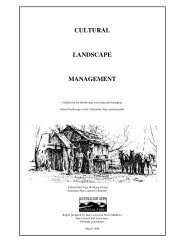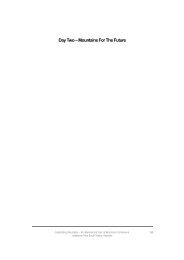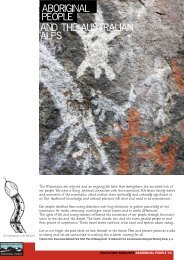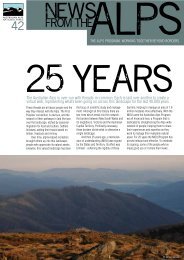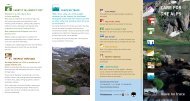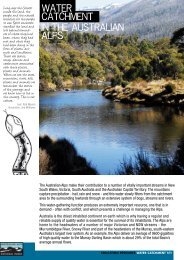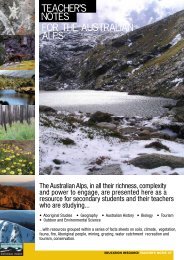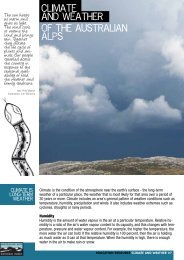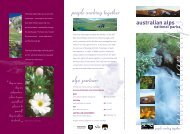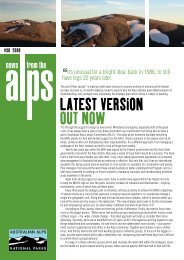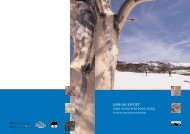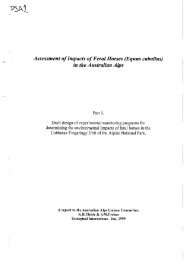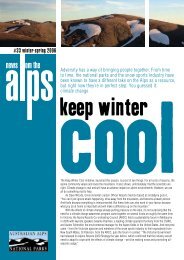Terms of Reference - Australian Alps National Parks
Terms of Reference - Australian Alps National Parks
Terms of Reference - Australian Alps National Parks
You also want an ePaper? Increase the reach of your titles
YUMPU automatically turns print PDFs into web optimized ePapers that Google loves.
Preamble<br />
<strong>Terms</strong> <strong>of</strong> <strong>Reference</strong><br />
<strong>Australian</strong> <strong>Alps</strong> Indigenous <strong>Reference</strong> Group (AAIRG)<br />
In accordance with the desire <strong>of</strong> the <strong>Australian</strong> <strong>Alps</strong> First Peoples as expressed at<br />
the gathering at Dinner Plain in April 2005, the <strong>Australian</strong> <strong>Alps</strong> Liaison Committee<br />
(AALC) wishes to establish the AAIRG. In doing so it commits to supporting the<br />
AAIRG morally and financially so far as <strong>Alps</strong> partner agencies policies and resources<br />
permit in accordance with these terms <strong>of</strong> reference.<br />
The AAIRG will operate under the following parameters.<br />
Area<br />
The AAIRG will advise the AALC on matters relating to the area referred to as “the<br />
<strong>Australian</strong> <strong>Alps</strong> national parks” (AAnp) in the MOU between The Commonwealth,<br />
Victoria, NSW and the ACT which currently includes the Alpine <strong>National</strong> Park, Avon<br />
Wilderness, Mount Buffalo <strong>National</strong> Park, Baw Baw <strong>National</strong> Park and Snowy River<br />
<strong>National</strong> Park (in Victoria), Kosciuszko <strong>National</strong> Park, Brindabella <strong>National</strong> Park,<br />
Scabby Range Nature Reserve and Bimberi Nature Reserve in NSW and Namadgi<br />
<strong>National</strong> Park and Tidbinbilla Nature Reserve in the ACT.<br />
Authority<br />
This group will provide advice to the AALC, (and through the AALC to the <strong>Australian</strong><br />
<strong>Alps</strong> Program Manager and relevant <strong>Australian</strong> <strong>Alps</strong> <strong>Reference</strong> Groups), with the<br />
AALC Convenor as Co-chair and a member <strong>of</strong> the AAIRG as the other Co-chair and<br />
the <strong>Alps</strong> Program Manager as the Executive Officer.<br />
Purpose<br />
To advise the AALC on a range <strong>of</strong> issues relating to the co-operative management <strong>of</strong><br />
Indigenous cultural values and issues across the AAnp that may include;<br />
1. How to engage Indigenous people in relevant key co-operative management<br />
activities, projects and decision making;<br />
2. Guidance on who speaks for country as required for particular issues;<br />
3. The development <strong>of</strong> <strong>Australian</strong> <strong>Alps</strong> wide capacity building programs; for<br />
example, cross cultural skills training including the identification, survey and<br />
monitoring <strong>of</strong> cultural heritage and interpretation;<br />
4. Engagement in the review and/or development <strong>of</strong> the AAnp Strategic Plan;<br />
5. Traditional Owner and other Aboriginal community needs and aspirations in<br />
relation to the <strong>Australian</strong> <strong>Alps</strong> and how these may be met;<br />
6. Accurate interpretation (and protocols for interpretation) <strong>of</strong> Indigenous cultural<br />
heritage to park visitors and the wider community;<br />
7. How histories can be accurately recorded and opportunities to promote<br />
awareness <strong>of</strong> <strong>Australian</strong> <strong>Alps</strong> Indigenous culture can be provided;
8. Mechanisms to improve communications and understanding between AAnp<br />
park managers and the broader Indigenous Community;<br />
9. Ways to progress the outcomes and recommendations <strong>of</strong> the First People’s<br />
Gathering at Dinner Plain, April 2005. (see Attachment 1 to these terms <strong>of</strong><br />
reference)<br />
Agency and park specific issues remain the domain <strong>of</strong> the individual State<br />
committees.<br />
Membership<br />
See Attachment 1 to these terms <strong>of</strong> reference.<br />
Up to two people (with a substitute member identified in case one <strong>of</strong> the regular<br />
members cannot make it to a meeting) being representatives from each <strong>of</strong> the<br />
existing agency/government advisory groups for national parks in the <strong>Alps</strong>, or other<br />
groups as identified by each jurisdiction, for example:<br />
1. Victorian <strong>Alps</strong> Indigenous <strong>Reference</strong> Group<br />
2. Kosciuszko <strong>National</strong> Park Working Groups (North and South)<br />
3. United Ngunnawal Elders Council or other mechanism identified by the ACT<br />
Government.<br />
A gender balance amongst the membership will be sought where appropriate.<br />
Term<br />
Members will be appointed for three years and will remain members for that period<br />
so long as they remain a member <strong>of</strong> one <strong>of</strong> the State/Territory groups as discussed<br />
above and while they remain the preferred nominees <strong>of</strong> that group.<br />
If a regular member does not attend three consecutive meetings <strong>of</strong> the AAIRG their<br />
membership <strong>of</strong> the AAIRG will automatically expire and a new representative from<br />
their State/Territory group would be sought. This does not apply to substitute<br />
members. However, if a substitute member is asked, with sufficient notice, to<br />
substitute for a regular member on three consecutive occasions and they do not,<br />
their membership will expire and a new substitute member will be sought.<br />
Should one <strong>of</strong> the members need to be replaced for any reason, the replacement<br />
member will only serve out the balance <strong>of</strong> the three year term <strong>of</strong> the person they are<br />
replacing.<br />
As the end <strong>of</strong> the three year term is approached the State/Territory groups will be<br />
asked by the AALC to review their nominations and advise who the new members<br />
will be. The State/Territory groups may choose to nominate the same people again.<br />
Meetings<br />
- Meeting agendas should allow for a short period (approximately 30 minutes),<br />
prior to the start <strong>of</strong> the formal agenda, for AAIRG members to conduct<br />
Nations’ business.<br />
- A meeting code <strong>of</strong> conduct was developed at the first meeting and is<br />
Attachment 2 to these terms <strong>of</strong> reference.
- Meetings will be held on Country only with the agreement <strong>of</strong> a Senior<br />
Traditional Owner <strong>of</strong> that Country. A Traditional Owner <strong>of</strong> the Country upon<br />
which the meeting is held will be invited to give a Welcome to Country at the<br />
beginning <strong>of</strong> the meeting. This may be a member <strong>of</strong> the AAIRG where<br />
appropriate. The costs <strong>of</strong> having a Traditional Owner, other than an AAIRG<br />
member, attend to provide the Welcome will be met by the AALC.<br />
- Meetings may be held at least two times per year, generally in Spring and<br />
Autumn to coincide with the development and approval <strong>of</strong> the AAnp annual<br />
budget and works program. More meetings may be held with the agreement<br />
<strong>of</strong> the AAIRG and the AALC.<br />
- The AALC convenor will be a Co-chair <strong>of</strong> the AAIRG. A Co-chair will be<br />
selected from amongst the members at each meeting for the next meeting<br />
dependent on where that meeting is to be held. For example, if the next<br />
meeting is proposed to be held in Victoria then a Victorian representative will<br />
be asked to be the next Co-chair. The Co-chair may only be selected from the<br />
regular members and not substitute members.<br />
- Meeting outcomes will be determined by consensus (i.e. via ‘round table’<br />
discussion rather than voting) and recorded in the minutes.<br />
- Should any <strong>of</strong> the nominated members be unable to attend, they may send<br />
their previously nominated substitute member.<br />
- Members may be accompanied on their journey to meetings by family, friends<br />
or other community members at their own expense, provided they give<br />
advance notice and accommodation is available – the AALC will normally only<br />
provide financial support for the nominated members <strong>of</strong> the AAIRG.<br />
- Normally it would be expected that other members <strong>of</strong> the AALC and members<br />
<strong>of</strong> the AAnp Cultural Heritage <strong>Reference</strong> Group would attend the AAIRG<br />
meetings as observers but will not be party to reaching consensus outcomes<br />
<strong>of</strong> the AAIRG.<br />
- Other observers may attend meetings but only with the advance agreement <strong>of</strong><br />
either one <strong>of</strong> the Co-chairs. In deciding if observers may attend, Co-chairs,<br />
where practicable and with the assistance <strong>of</strong> the <strong>Australian</strong> <strong>Alps</strong> Program<br />
Manager if necessary, will consult with AAIRG members. Observers will not<br />
normally receive financial assistance from the AALC to attend meetings.<br />
- The <strong>Australian</strong> <strong>Alps</strong> Program Manager will co-ordinate meeting logistics and<br />
minutes and maintain records.<br />
- Meetings should preferably be held in or close to the AAnp where suitable<br />
accommodation can be provided.<br />
- Sitting fees and other expenses will be paid to members and these are<br />
outlined at attachment 3.
Attachment 1<br />
AUSTRALIAN ALPS<br />
INDIGENOUS REFERENCE GROUP<br />
DISCUSSION PAPER
BACKGROUND:<br />
The combination <strong>of</strong> agency specific Aboriginal reference and working groups<br />
(including the recently formed Victorian <strong>Alps</strong> Indigenous <strong>Reference</strong> Group), the Kaju<br />
Ceremony and IYM Celebrations, the 2003 Post Fire Indigenous Cultural Heritage<br />
Programs across the <strong>Alps</strong> and the <strong>Australian</strong> <strong>Alps</strong> First Peoples Gathering conducted<br />
at Dinner Plain, has helped develop an enduring level <strong>of</strong> respect and cooperation<br />
between Traditional Owners with links to the <strong>Australian</strong> <strong>Alps</strong>.<br />
The dialogue which has flowed through these shared experiences has revealed the<br />
time is now right to build upon the abundance <strong>of</strong> goodwill and move toward the<br />
formation <strong>of</strong> an <strong>Australian</strong> <strong>Alps</strong> Indigenous <strong>Reference</strong> Group. In recognition <strong>of</strong> the<br />
importance <strong>of</strong> this ideal the <strong>Australian</strong> <strong>Alps</strong> Liaison Committee (AALC) has made it<br />
an action to be pursued asap.<br />
<strong>Australian</strong> <strong>Alps</strong> First People’s Gathering and Victorian <strong>Alps</strong> Indigenous<br />
<strong>Reference</strong> Group<br />
A number <strong>of</strong> years ago the <strong>Australian</strong> <strong>Alps</strong> Liaison Committee commissioned an<br />
Aboriginal Heritage Liaison and Directions Study. Feedback obtained from this study<br />
and Indigenous events associated with the International Year <strong>of</strong> the Mountains,<br />
revealed a desire by Indigenous communities associated with the <strong>Australian</strong> <strong>Alps</strong>, to<br />
come together to discuss various matters pertaining to Aboriginal involvement in the<br />
management <strong>of</strong> the <strong>Australian</strong> <strong>Alps</strong>.<br />
On the 1 st to the 3 rd <strong>of</strong> April 2005 the <strong>Australian</strong> <strong>Alps</strong> Liaison Committee hosted the<br />
“<strong>Australian</strong> <strong>Alps</strong> First Peoples Gathering” at Dinner Plain. Amongst the many<br />
aspirations voiced by Indigenous representatives at this gathering was the desire by<br />
Traditional Owners with links to the Victorian <strong>Alps</strong>, to form an Indigenous <strong>Reference</strong><br />
or Working Group which could enable greater participation in the care <strong>of</strong> the Victorian<br />
<strong>Alps</strong> and enhanced consideration <strong>of</strong> Indigenous values and interests. The precise<br />
wording <strong>of</strong> the resolution <strong>of</strong> the gathering was as follows:<br />
“Seek the establishment <strong>of</strong> a Victorian Aboriginal Working Group <strong>of</strong> Traditional<br />
Owners/families similar to the Kosciuszko <strong>National</strong> Park Working Group (NSW)”.<br />
A subsequent objective <strong>of</strong> the group would be to form part <strong>of</strong> a larger <strong>Reference</strong><br />
Group incorporating Indigenous representatives from NSW and the ACT. Once<br />
established, the aim <strong>of</strong> this larger group would be to help integrate an Indigenous<br />
community perspective into the management <strong>of</strong> the <strong>Australian</strong> <strong>Alps</strong>.<br />
It is in the above context that <strong>Parks</strong> Victoria committed to the creation <strong>of</strong> a Victorian<br />
<strong>Alps</strong> Indigenous <strong>Reference</strong> Group. This group has now held a number <strong>of</strong> meetings<br />
and is very keen to pursue the creation <strong>of</strong> the <strong>Australian</strong> <strong>Alps</strong> group.<br />
This discussion paper has been developed in an attempt to facilitate this process.<br />
Input will need to be sought on a range <strong>of</strong> topics including appropriate terms <strong>of</strong><br />
reference, authority and appropriate membership.
Outcomes <strong>of</strong> the <strong>Australian</strong> <strong>Alps</strong> First Peoples Gathering 1-3 April 2005<br />
Through discussions the Traditional Owners resolved to:<br />
Commit to developing a draft ‘Treaty’ (or MOU) between the <strong>Australian</strong><br />
<strong>Alps</strong> First Peoples to establish ways for them to work more effectively<br />
together as one group. The Traditional Owners Women’s group<br />
supported the motion on the condition that any future draft ‘Treaty’<br />
ensured a gender balance and future discussions and negotiations and<br />
would reflect both women’s and men’s aspirations and needs. The<br />
motion was then adopted by the majority <strong>of</strong> those present. (see<br />
enclosed)<br />
Seek a commitment from land management agencies to recognise that<br />
Traditional Owners with connection to Country are the only legitimate<br />
Indigenous speakers for Country.<br />
Seek to set aside an area(s) <strong>of</strong> crown land in the <strong>Alps</strong> where Traditional<br />
Owners (both men and women) can meet and continue traditions,<br />
practices and customs through stories and observation and pass onto<br />
their youth their culture, language and oral history to ensure the<br />
continued wellbeing <strong>of</strong> Traditional Owners and their Country.<br />
Seek establishment <strong>of</strong> an <strong>Australian</strong> <strong>Alps</strong> First Peoples Keeping Place.<br />
Seek access to cultural resources i.e. traditional fishing, hunting,<br />
collecting and gathering rights without license.<br />
Seek to set areas aside to provide for reburials <strong>of</strong> ancestors skeletal<br />
remains on Country.<br />
Request agencies to consult with Traditional Owners prior to the<br />
agencies seeking ‘Consents to Disturb or Destroy’ their cultural sites or<br />
places.<br />
Seek support for Traditional Owners to bring traditional language back<br />
and utilise it during meetings, events, in reports, signage and<br />
interpretation.<br />
Seek the establishment <strong>of</strong> a Victorian Aboriginal Working Group <strong>of</strong><br />
Traditional Owners/families similar to the Kosciuszko <strong>National</strong> Park<br />
Working Group (NSW).<br />
Seek resources from land management agencies and/or <strong>Australian</strong><br />
<strong>Alps</strong> cooperative management program (AALC) to ensure equity <strong>of</strong><br />
involvement <strong>of</strong> Traditional Owners in all aspects and levels <strong>of</strong> land and<br />
waterways management – resourcing to include funds for meetings,<br />
workshops, gatherings, accommodation, travel and meals.<br />
Seek improved employment opportunities – by having agencies:<br />
actively target Traditional Owners from Country, provide on-the-job<br />
training, allow flexible work practices especially for women with<br />
dependent families and provide training which builds skills and<br />
capabilities <strong>of</strong> communities to compete for jobs effectively.<br />
Staff <strong>of</strong> the land management agencies at the Gathering:<br />
Agreed to receive the recommendations <strong>of</strong> the Gathering and<br />
communicate them back to the relevant agencies with the ability to act<br />
on them, and<br />
Invited the Gathering to nominate a small interim ‘working group’ to<br />
look at models that engages the Traditional Owners on an equitable
asis to ensure everyone could more effectively work together in<br />
management <strong>of</strong> the <strong>Australian</strong> <strong>Alps</strong> national parks<br />
Agency staff presented a possible model for consideration (see<br />
enclosed).<br />
General:<br />
It was agreed by all as important that the momentum <strong>of</strong> goodwill and<br />
understanding was maintained and that the recommendations be<br />
pursued.
Meeting Code <strong>of</strong> Conduct:<br />
Attachment 2<br />
1. Speaking privilege may be granted by a Co-chair following raising <strong>of</strong><br />
the hand<br />
2. Other members must respect the speaker who has the floor<br />
3. Members will respect peoples values and opinions<br />
4. No abusive, threatening or aggressive speaking and behaviour will be<br />
tolerated<br />
5. If a person acts in a way outlined in point 4 a Co-chair will ask the<br />
person(s) to leave the meeting and take time out to think, calm<br />
down/cool <strong>of</strong>f, and return only if able to conduct themselves<br />
appropriately<br />
6. Everyone will use simple language that is accessible to all<br />
7. Everyone will respect times and attendance for meetings and the<br />
agenda<br />
8. Members will provide advance notice for apologies or substitute<br />
representation<br />
9. Members should be impartial and differences be left outside the room<br />
10. Indigenous members have the right to ask non-Indigenous members<br />
to leave the room if Indigenous business needs to be discussed<br />
This code may be changed at meetings with the agreement <strong>of</strong> all at the meeting
Attachment 3<br />
Fees and Expenses<br />
For AAIRG members, sitting fees and reasonable expenses for attending meetings<br />
will be paid. Commonwealth Remuneration Tribunal guidelines will be adopted for<br />
fees and expenses. These are adopted as a guide only and are not payable due to<br />
any statutory requirement. All fees and expenses will be paid following a meeting<br />
through the accounts payable system <strong>of</strong> the administering agency. Normally these<br />
would be paid within 7 to 14 days after a meeting.<br />
AAIRG members may receive:<br />
- Sitting Fees for meetings they actually attend.<br />
o<br />
Conditions: In the case <strong>of</strong> an intention to attend and then cancelling,<br />
no fee is payable. If only part <strong>of</strong> a meeting is attended the member<br />
may receive only a part payment <strong>of</strong> the sitting fee. The “daily” Sitting<br />
Fee is payable for each meeting ie meetings that are across an<br />
afternoon and morning on two consecutive days do not attract double<br />
sitting fees. Travel time to and from meetings is factored into the<br />
determination <strong>of</strong> the fees and additional fees are not payable for<br />
travelling time. In the exceptional case where it is necessary to<br />
conduct a meeting that spans a period <strong>of</strong> more than one full day or<br />
two consecutive half days the AALC may consider the payment <strong>of</strong> an<br />
additional allowance.<br />
- a vehicle (mileage) allowance when they use a private vehicle to travel to<br />
meetings or in the case <strong>of</strong> another person driving them to a meeting.<br />
o<br />
Conditions: In the case <strong>of</strong> the latter, the AAIRG member will be paid<br />
the allowance by the AALC and the member must then come to an<br />
arrangement with the third party for covering costs. To standardise the<br />
amount paid for vehicle allowance the distance travelled will be a<br />
maximum <strong>of</strong> the total round trip kilometres from the member’s normal<br />
place <strong>of</strong> residence to the meeting venue by the most direct practicable<br />
route and can include any travel between the meeting venue and the<br />
meeting accommodation venue if they are not at the same location.<br />
Kilometres travelled because <strong>of</strong> side trips en route or onto or from<br />
other locations at the member’s choice will not be included in the total<br />
for payment. Where members are transported in a <strong>Parks</strong> agency<br />
vehicle for the entire or part <strong>of</strong> a journey to attend meetings, a vehicle<br />
allowance is not payable for that part <strong>of</strong> the journey.<br />
If a member starts on the journey to the meeting but for one reason or<br />
another does not actually attend the meeting then no vehicle<br />
allowance will be paid. Exemptions may be made to this rule under<br />
extenuating circumstances eg vehicle breakdown.<br />
Meeting costs such as meals, accommodation and refreshments will be paid directly<br />
to the service provider by the AALC where practicable. Where it is not practicable to<br />
do so, AAIRG members may pay these costs as agreed by the AALC and be<br />
reimbursed by the AALC through the accounts payable system as described above<br />
but only on production <strong>of</strong> a correct tax invoice provided by the service provider.<br />
Normally, advances or cash payments will not be possible.
The AALC will provide reasonable catering and accommodation for each AAIRG<br />
member, and may, by prior negotiation, host additional individuals. The AALC<br />
reserves the right to limit numbers based upon such matters as equity, cost and<br />
availability <strong>of</strong> accommodation.
Attachment 4<br />
List <strong>of</strong> Traditional Owner groups who are currently (September 2008) identified<br />
as having Traditional Country that cover parts <strong>of</strong> the <strong>Australian</strong> <strong>Alps</strong> national<br />
parks:<br />
<br />
<br />
<br />
<br />
<br />
<br />
<br />
<br />
<br />
<br />
<br />
<br />
<br />
Bidawal<br />
Monero-Ngarigo<br />
Gunai-Kurnai<br />
Yeerung Kurnai<br />
Jaimathang<br />
Taungurung<br />
Mitambuta<br />
Dhudhuroa<br />
Ngarigu-Currawong<br />
Wiradjuri<br />
Wongalu<br />
Ngunnawal<br />
Wirunjeri


